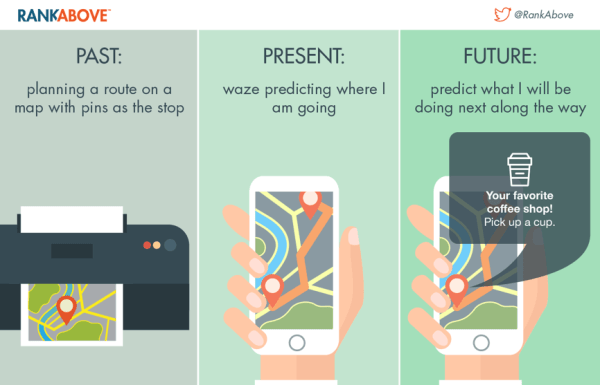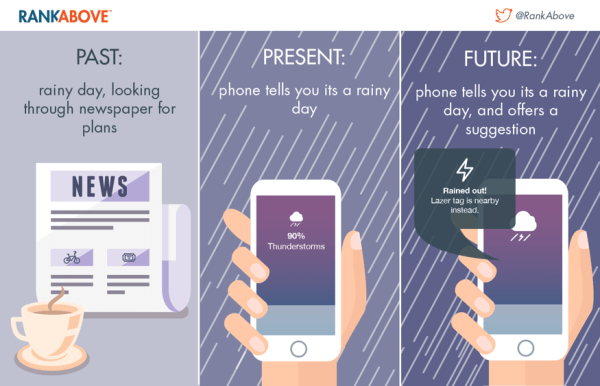The Future Of Search Engines Is Context
Columnist Aaron Friedman discusses a mobile search future based on context and the Internet of Things (IoT).

As mobile continues to grow, as more smartphones are bought, and as more apps are developed, we have also seen the growth of businesses like “app store optimization” and other services around optimizing for mobile.
But what exactly are users doing on their phones? Is mobile SEO just going to be about “chasing the algorithm” and using the signals we learn through testing like traditional SEO? Or is there something bigger out there that we are missing?
As I write this, I have to remind myself that I am the minority and that most users are not as “technically minded” as myself or my internet-obsessed peers. I tend to search through the app stores to see what’s new. I scour tech sites, my RSS feeds, and other tech reporters on social media to see what’s changing in the market.
The average user in society does not behave this way, despite what some reports might say. The average user is looking for simplicity and wants information spoon-fed to them. They don’t want to search at all; in fact, the data suggest that they aren’t searching all that much on their phones to begin with:
[blockquote cite=”Roi Carthy, head of special projects at Everything.Me”]The average person with an Android smartphone is using it to search the web, from a browser, only 1.25 times per day.[/blockquote]
Kind of makes you wonder what people are actually doing on their phones, right?
What People Do (And Don’t Do) On Smartphones
Almost all users, if not all users, use their phones with apps. They are highly engaged in social media, playing games, and communicating. But what most users are not doing regularly is conducting searches in a browser, let alone within the app store. The data suggest that users are more interested in the usefulness of the apps they have– they don’t necessarily search to find new ones that solve a need.
Context Will Solve The App Discovery Problem
Contextual understanding is about giving people the information they want when they need it the most. Remove the hard work for them and deliver what they will likely want at that exact moment.
As an example: I am a frequent user of Uber and GetTaxi, but what if I land in a city where neither of those apps work? I can either call a taxi or find a comparable app, though it’s unlikely that I am going to take out my phone right then and start searching the app store.
Bridging that gap with a contextual app discovery engine would solve for that by algorithmically recommending relevant apps to me based on my behavior, location, and/or other factors.
But this contextual understanding can span far beyond apps.
Adding Context To Search
Google has been personalizing search results for a years now using our search history and social activity. This is, however, limited to activity within Google products.
Imagine for a moment you are on a strict workout regimen, tracking the calories eaten on a phone app. Google may find this information useful when you perform a search for recipes. The results could be impacted by the calorie limit you set. Or better yet, Google could strive to understand your general eating habits and show different recipes at different times of days to help you achieve your weight loss goals.
Thinking Beyond Search
When the industry talks about context, limiting this to search and apps alone is a mistake. It needs to incorporate other parts of our daily activities for it to truly work. Just look at your Amazon recommendations after you search for “bachelor party favors,” or the Netflix history when there is trouble in paradise. The results can be terrifying, inaccurate, and not a true reflection of your interests. There needs to be more context behind it.
Google Now Is Contextual, But Not Necessarily Integrated
Google has been headed into the world of context more and more. Sometimes, the integration can be so incredibly seamless it’s frightening. Take, for example, how Google scans your email for various information like flights.
When my mother was visiting us from abroad, I was supposed to drive her to the airport around 6:30 p.m. for her 11:00 p.m. flight — that is, until I got a notification on my phone that her flight was delayed.
So, I casually said to her, “Mom, your flight is delayed.”
“How do you know?”
“My phone just told me,” I responded. It was so natural.
A part of me thought, “Google, stay out of my life!” But the more technically savvy part thought that it was truly a magical experience.
Contextual Understanding Moves To Everything
Take that example a step further. What if my phone had found a way to provide discounts to the airport bar — or, in the event of a flight cancellation, a possible hotel recommendation using HotelTonight or a similar app?
The possibilities are endless. It’s just about mixing and matching permissions across apps and having one program smart enough to do that.
Permit me some examples:
Navigation & Travel
When I turn my phone on, Waze understands (or predicts) where I will be traveling based on numerous factors.
Waze does use predictive technology to some extent with ads they show when you stop, but there is still room for a significant amount of personalization to occur. The opportunities are limitless to guess what I will do next and connect me with my friends across the network.
Wearable Technology Serving Ads In Context
The Fitbit I own tracks how far I am walking, my speed, calories burned, sleep, and other various components. That is an incredible amount of data that could significantly enhance my mobile experience.
Using this data, my phone can start making predictions based on how fast I am moving or where I am geographically located. If the data tells Google I had a bad night sleep, and missed my bus, a nearby local coffee shop may decide to serve me a coupon for a free cup of coffee to get me in the door. Or, based on my eating habits (which come from the food app I am using), and depending on the time of day and the direction I am driving, it could suggest a nearby restaurant that fits that category but is new to me.
Helping Relationships
Facebook understands who my wife is based on my relationship status. My phone also has the capability to “always listen” (cue “OK Google”).
Imagine for a second I am out, and a certain song comes on: the song that played at our wedding. SoundHound, which is a song recognition app, could pick that signal up and remind me to send my wife flowers, just because.

A Rainy Day Solution
Lets say I have a family outing planned at the county fair. As fate would have it, storms start rolling in. Understanding this, I might get a recommendations for alternative indoor plans, keeping me one step ahead of the crowd. Perhaps Lazer Tag.
The Future Is Around the Corner
We see this happening in silos right now so I don’t think this is so far off. Some apps are getting smarter, Google Now is providing additional context around our lives. But this fusion hasn’t entirely happened yet. It will only be a matter of time before someone decides to utilize this data to effectively make “a decision engine” for us, the end users. This contextual understanding is the future, and it’s only a matter of time.
The dynamic search engine we know today will be significantly altered in the future. The future is about understanding user behavior online and offline. Perhaps the future of optimization has nothing to do with the internet at all, but everything to do with optimizing the user’s experience, helping shape their behavior, which will ultimately affect everything.
Contributing authors are invited to create content for Search Engine Land and are chosen for their expertise and contribution to the search community. Our contributors work under the oversight of the editorial staff and contributions are checked for quality and relevance to our readers. The opinions they express are their own.
Related stories
New on Search Engine Land





